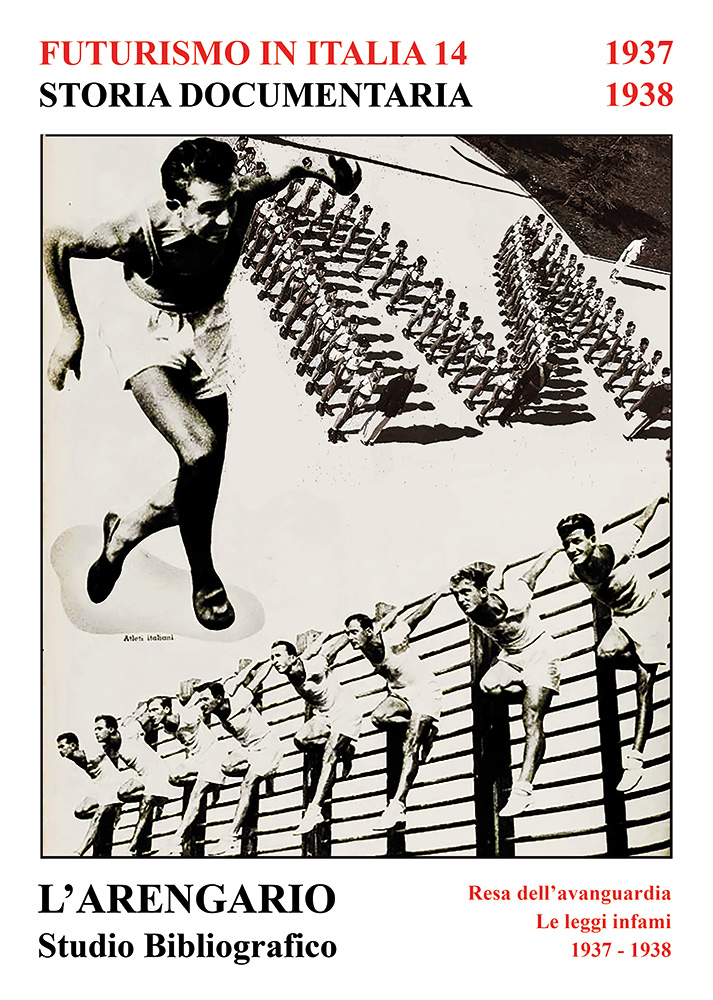L'ARENGARIO STUDIO BIBLIOGRAFICO - Dott. Paolo Tonini
Futurismo in Italia - 14. Resa dell'avanguardia. Le leggi infami (1937 - 1938)
Luogo: Cellatica
Editore: L'Arengario Studio Bibliografico, "Storia Documentaria del Futurismo in Italia - 14"
Stampatore: prodotto in proprio
Anno: 2024 (8 settembre)
Legatura: brossura
Dimensioni: 29,7x21 cm.
Pagine: pp. X - 94 (4)
Descrizione: copertina illustrata con un e-collage in seppia. Catalogo interamente illustrato a colori, 94 schede ragionate, a cura e con testo introduttivo di Paolo Tonini («Futurismo e razzismo» / «Futurism and racism»). Edizione digitale.
Bibliografia: N. D.
Prezzo: N. D.ORDINA / ORDER
"L’allontanamento dal lavoro e dalle cariche pubbliche delle persone di razza ebraica, la discriminazione sociale, l’invito alla delazione, e l’egida «scientifica» che permeava questi provvedimenti, l’eco martellante all’unisono della stampa e della pubblicità non trovarono una eco nell’ambito del futurismo ma a parte rare eccezioni neanche una decisa opposizione. La resa dell’avanguardia si espresse nella illusione di rappresentare le istanze più o meno rivoluzionarie che il potere mitizzava: il compromesso sembrava necessario. Notava Glauco Viazzi, riferendosi al libro di Emilio Buccafusca «Studenti fascisti cantano così» (1938): «...un futurismo che non sta più all’opposizione rispetto al potere, vi si identifica invece, e interamente, con l’ambizione di rappresentarne la vera natura, l’autentica tendenza (mentre il potere dà evidenti segni di pensarla altrimenti)»” (dal testo introduttivo).
"The dismissal of Jewish people from jobs and public positions, social discrimination, the invitation to denounce, and the “scientific” endorsement that permeated these measures, along with the relentless echo from the press and the advertising campaigns, found little resonance in Futurism, but, apart from a few rare exceptions, no firm opposition either. The surrender of the avant-garde was expressed in the illusion of representing the revolutionary demands that Power mythologized: compromise seemed necessary. Glauco Viazzi, referring to Emilio Buccafusca’s book Students Fascists Sing Like This (1938), noted: «...it was a Futurism that no longer stood in opposition to Power but instead identified fully with it, with the ambition of representing its true nature, its authentic tendency (while Power showed clear signs of thinking otherwise)»”.
DOWNLOAD PDF FILE
"The dismissal of Jewish people from jobs and public positions, social discrimination, the invitation to denounce, and the “scientific” endorsement that permeated these measures, along with the relentless echo from the press and the advertising campaigns, found little resonance in Futurism, but, apart from a few rare exceptions, no firm opposition either. The surrender of the avant-garde was expressed in the illusion of representing the revolutionary demands that Power mythologized: compromise seemed necessary. Glauco Viazzi, referring to Emilio Buccafusca’s book Students Fascists Sing Like This (1938), noted: «...it was a Futurism that no longer stood in opposition to Power but instead identified fully with it, with the ambition of representing its true nature, its authentic tendency (while Power showed clear signs of thinking otherwise)»”.
DOWNLOAD PDF FILE

